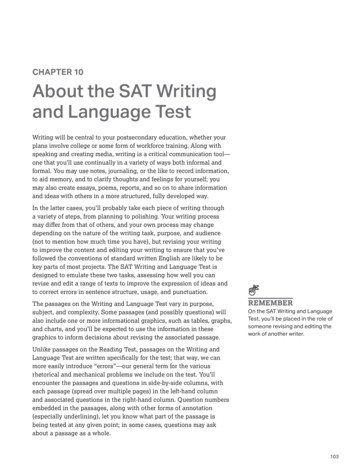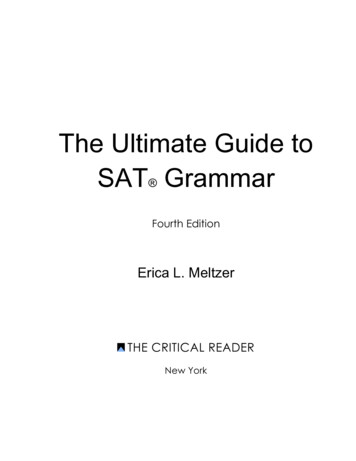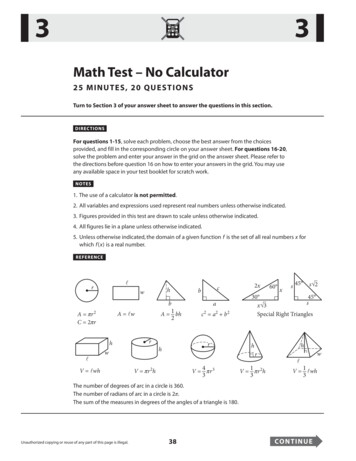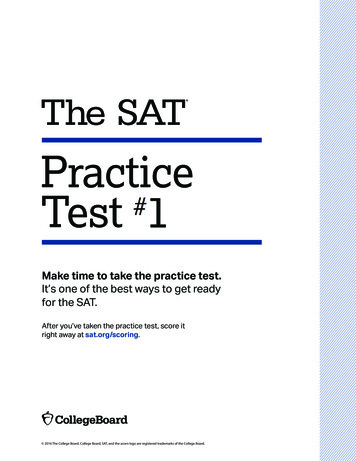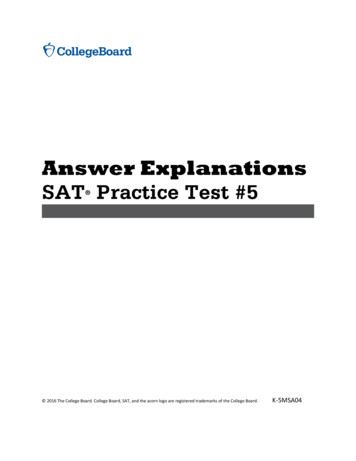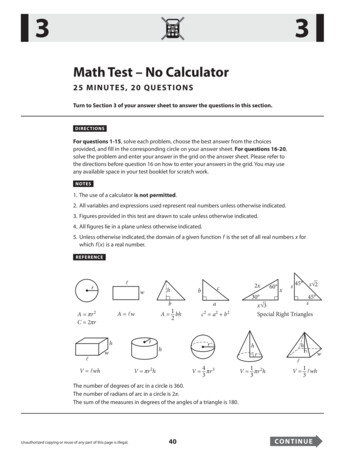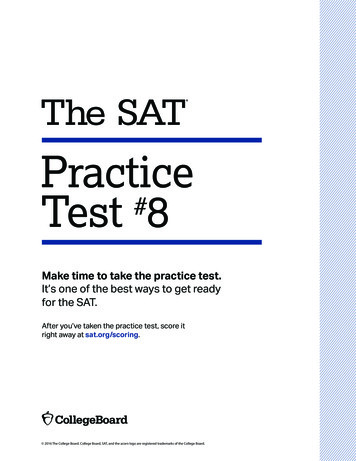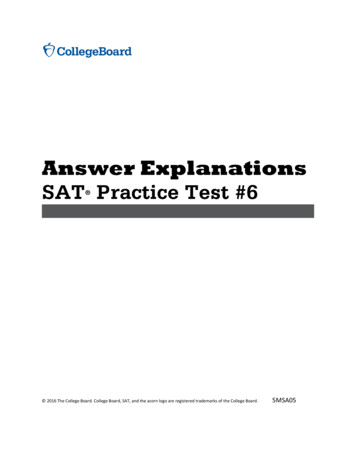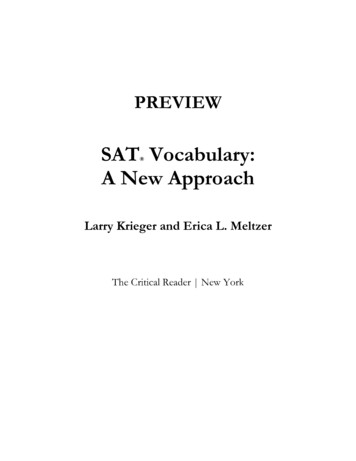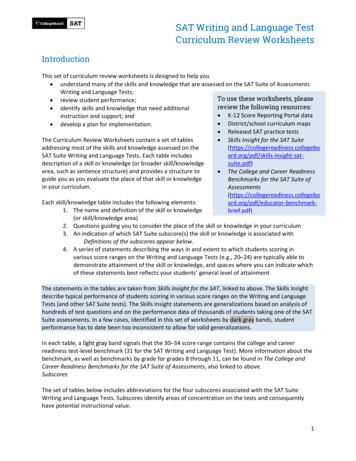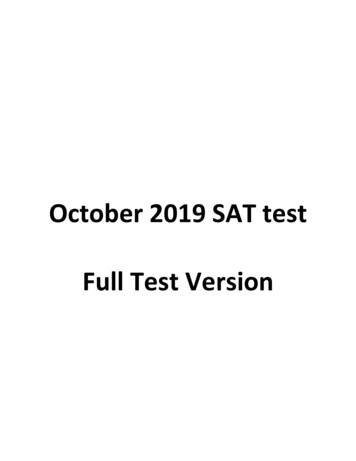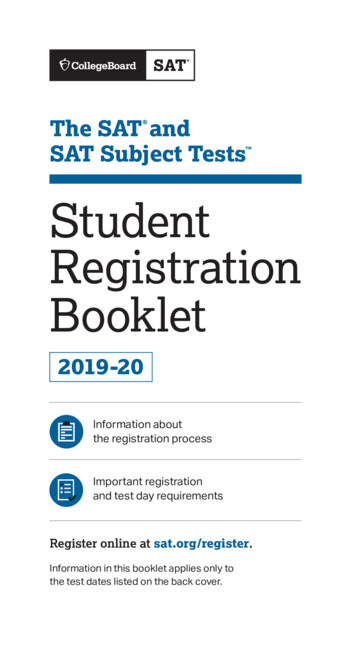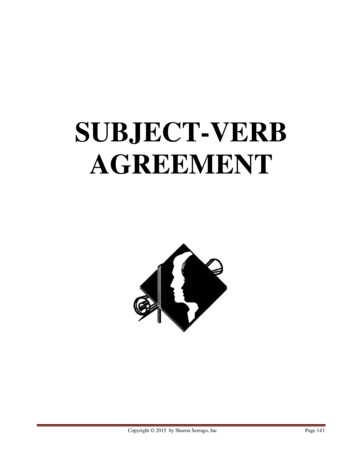
Transcription
SUBJECT-VERBAGREEMENTCopyright 2015 by Sharon Serrago, IncPage 143
Subject-Verb AgreementSubject-Verb Agreement is one of the areas you have surely studied in your English classes. As youhave seen, there are many rules governing the usage of subjects and verbs. We will cover several ofthem here.Agreement of Subjects and VerbsThe first thing you must know is that the subject of the sentence and the verb of the sentence mustagree in number. If the subject is plural, then the verb must be plural also. If the subject is singular,then the verb must be singular also. Whatever the subject is, the verb must be the same. That’s whywe call it agreement. The subject and verb must agree with each other in number.Perhaps the most critical thing for you to know is that all singular verbs end in “s” . with theexception of “I am” and “you are.” Look at these verbs: is, are, do, does, seem, seems, ask, asks, was,were. The ones that end in “s” are all singular: is, does, seems, asks, was.Look at all the following verbs and label each as singular or plural.1. was4.is2. look5.were3. thinks6.askNow let’s look at some simple sentences and you decide which verb must agree with the subject.Follow these steps.1. Decide upon the subject.2. Determine whether it is singular or plural.3. Choose the verb form that is the same as the subject, singular or plural.1. That man (is, are) the one who painted our house last summer.2. Those children (was, were) arranged according to height.3. James (asks, ask) a lot of questions because he is anxious to learn.4. All our geese (swims, swim) in the pond adjacent to our property.5. Some boys (runs, run) much faster than others.6. Our vacation (lasts, last) for three weeks this year.7. Sam (want, wants) to know the results of the test last week.8. Each one (has, have) his own idea about how the outcome should be.9. Everything (was, were) laid out on the table in preparation for the meal.10. The cars (was, were) about to be washed by the school’s club.Copyright 2015 by Sharon Serrago, IncPage 144
Subjects and Prepositional PhrasesTrying to be sure the subject and the verb agree may seem like a simple task, but for many studentsthe task becomes complicated because of the difficulty in actually identifying the subject in the firstplace. It’s easy enough to make the subject and verb agree you are looking at a very simple sentence,but in a complicated sentence structure like you will find on the SAT, finding the subject is not suchan easy task at all.There are some ways to make that task easier. First, you should eliminate constructions in thesentences that you know can’t be the subject. One of the things we can eliminate is the prepositionalphrase. There may be several of them in one sentence. In fact, the more sophisticated the sentence, themore propositional phrases the sentence is likely to have. Once you eliminate all prepositionalphrases, finding the subject will be much easier.Let’s review what you already know about prepositions, and then we will move on to prepositionalphrases. A preposition is a word that shows a relationship to another word in the sentence. Manyprepositions show a spatial relationship to another word. Take a look atthis cat and the tree.Any position the cat can have in relation to the tree is going to be apreposition. For instance, the cat can be beside the tree, in the tree, on thetree. Look at the prepositions that can express a spatial relationship: over,above, under, underneath, between, by, beneath, to, from. He can go up,down, into, out, through, across, along, around, beneath, beside, behindthe tree. These are only a few prepositions. There are others such as like, with, without, to, about,after, during, following, concerning, regarding, aboard, against, amid among, around, at,before, below, beyond, but, considering, despite, except, excluding, for, of, inside, near, off,onto, outside, past, per, plus, round, save, since, toward, unlike, upon, versus, via, within.We also have a compound prepositions, two or more words commonly used as a singlepreposition: on top of, according to, along with, apart from, by virtue of, due to, except for, inaddition to, in between, out of. There are more, but you will be able to recognize them.Let’s Practice – Finding PrepositionsUnderline the prepositions in the following sentences.1. He ran on the sidewalk.2.The child jumped into the hole.3.Before class, the children walked slowly down the hall.4.Beside the road lay the old cart.5.The cat sat on the shelf above the door.6.Into the room they calmly strolled.7.Under no circumstances are you to touch that glass sitting on the table.8.He saw the book on top of the desk in his friend’s room.9.We built the tree house for the child.10. With a big crash, the tree toppled onto the garage.Copyright 2015 by Sharon Serrago, IncPage 145
Next, we need to learn how to identify prepositional phrases so that we can eliminate them and makeit easier to find the subject of the sentence. It is important to know that every preposition must havean object. Many students confuse the object of the preposition with the subject. When you eliminatethe whole phrase, this will not happen to you. The object of the preposition is the first noun after thepreposition. The two words together constitute a prepositional phrase. The prepositional phrasebegins with the preposition, ends with the 1st noun after it, and includes all words (adjectives andadverbs only) in between.Example: The dog with the dirt on his face ran through the puddle in the middle of the road.These are the prepositional phrases:with the dirton his facethrough the puddlein the middleof the roadThe nouns in the phrases are the objects of the prepositions: dirt face puddle middle roadIn each phrase, the first noun after the preposition is the object of the preposition.It is possible to have a compound object.Example: My teacher gave the award to Bob and me.The compound object of the preposition is Bob and me.Remember this: If a word functions as the object of the preposition, it cannot possibly be the subject.Thousands and thousands of students will make the mistake of calling the object of the preposition thesubject of the sentence. Make sure that you know the difference!CRITICAL: You must learn to eliminate prepositional phrases when you analyze test questions forsubject-verb agreement. The harder the questions are, the more critical it is that you get rid of theprepositional phrases before analyzing the sentence.Let’s Practice – Identifying Prepositional PhrasesUnderline the prepositional phrases in the following sentences. Put parenthesesaround the object of the preposition in each sentence.1.2.3.4.5.6.7.Behind the tree on the side of the bank is the wagon.The girl with the purple flower on her skirt was at the park in Dallas in the middle of the day.Along the side of the road lay a robin, all crusted with dirt and debris.Without a doubt, the most critical factor in the experiment is the health of the participants.The dog in the window of the pet shop looked at us and barked for attention.The man on the bench under the tree is reading a book about the discovery of America.In spite of the torrential rain, the troop marched through the woods and followed a trail of yellowcorn left by their captain.Once you eliminate the prepositional phrases, you will find it much easierto identify the subject of the sentence.If a word is part of a prepositional phrase, it is not possible for it to be the subject.Copyright 2015 by Sharon Serrago, IncPage 146
Parenthetical Expressions, Appositives, and other DistractorsAnother thing you will need to eliminate when looking for the subject of the sentence is all sorts ofstuff that really isn’t part of the major sentence elements. If you can’t find the subject, then you can’tbe sure that the subject and verb agree.Your first task is to get rid of prepositional phrases when you are analyzing sentences.Your second task is to get rid of any information in the sentence that is set off by commas. This caninclude a great many things, namely appositives, parenthetical expressions, and non-restrictive clausesand phrases, which we will learn about much later. Rather than go into all the possibilities, let’s justsay that if anything in the sentence has commas before it and after it, then you want to consider gettingrid of it. Look at the following diagram., ////////////, .Sentence All the stuff between the commas should be eliminated. You will not find the subject of the sentencein that information. Just consider, the commas that set off the information are telling you that thisinformation, while perhaps interesting, is not part of the basic sentence.,,Example: Get on Board a motivation group that works with both employers and employees helpboth parties to understand the problems inherent in the management of business.If you look carefully, you will see that the subject and the verb of the sentence do not agree. Moststudents will miss a question like this since the sentence sounds so good to be wrong. Again, here’sour trick that will help us to see the answer quickly. Get rid of the information set off by commas: amotivation group that works with both employers and employees. You see the comma before thephrase and after the phrase. Don’t read the stuff in between. Skip over it, and you will see the mistakein the sentence easily. Get on Board help both parties .Finding the Verb of the SentenceWhen you are trying to find the subject of the sentence, your first task is to draw a line through theprepositional phrases. Then eliminate any information set off by commas.Now it’s time to find the verb. The simplest way is to look for a word that shows action. That’s theverb. It tells what’s happening. It might also help to know that all verbs have a form for “ing.”run runningsing singingthink thinkingask askingThe only verb that is different is the verb “be.” You have to memorize the various forms of that verb.am, are, is, was, were, be, been, being. There it is. The “ing” form for be is being. Of course, youhave to know that was is part of the be verb. You can’t say wasing. Other than this one verb, all otherverbs have an ing form that is very easy to find.Copyright 2015 by Sharon Serrago, IncPage 147
When you locate the verb, ask who is doing that action. That will lead you to the subject, since thesubject generally performs the action.Example: Between every class, that student in the black baseball hat shouts to the rest of the studentsin the hallway.First, draw a line through the prepositional phrases.Between every class, that student in the black baseball hat shouts to the rest of the students in thehallway.Next you find the verb from the words that are left. Look for a word that shows action. In this example, the action is shouts. That’s the verb. To be sure it’s a verb, try putting -ing onto some form of the word. Shouting. All verbs have aform for -ing.Now ask yourself who is doing that action. That will be the subject. In this sentence you would ask,“Who is shouting?” Answer: The student. The subject, then, is student.subjectverbAnswer: Between every class, that student in the black baseball hat shouts to the rest of the studentsin the hallway .Once you have found the subject and the verb, you are ready to see if they agree. Remember that if thesubject is singular, then the verb must be singular. It must end in s. If the subject is plural, the verbmust also be plural. It cannot end in s. All singular verbs end in s.Let’s Practice – Identifying Subjects and VerbsDraw a line through the prepositional phrases in the following sentences. Identifythe subject and verb of the sentence. If the subject and verb agree in number, writeCorrect in the blank. If they do not agree, write Incorrect.1. Long before the last freeze of the winter, come beautiful blooms of the violet.2. Throughout the room was the unbelievably loud and shrill cries of the child.3. After the second course of their meal, the third course of the feast, which includedcheeses, cream, and fruits, were served.4. Even after the encore the cheers of the attentive man in the audience was quiteastounding.5. Quietly through the leaves of the tree comes the mournful chirps of the lonely bird.6. Only after the judge’s final sentence does the attorney for the defense feel he can relax.7. Far away from the crowd comes the muddy waters rushing past the flooded banks.8. From the house on the distant hill, few details of the newly blooming tree are seen.Copyright 2015 by Sharon Serrago, IncPage 148
Let’s Practice –Eliminating prepositional phrasesDraw a line through the prepositional phrases before you begin looking for the subject. Decidewhether the subject of the sentence is singular or plural. Then underline the correct form of the verbin e author of the stories in these books (is, are) Jackie Lander.Candace, along with her sisters Lucy and Janet, (was, were) at the party.One typewriter for two or three students (seems, seem) adequate.This collection of poems (look, looks) interesting.The poems in our literature book (is, are) well chosenMany lines in the poem (is, are) especially good.The scenes on each village street (lives, live) again.The antics of the old man always (makes, make) me laugh.Kathy, along with her sisters, (has, have) chicken pox.A ring of towering mountains (enclose, encloses) the valley.The cause of her troubles (was, were) apparent.The cut of her clothes (is, are) always just right.This book of short stories (is, are) interesting.Members of the council (enjoys, enjoy) special privileges.The cats in the alley (is, are) wild.Indefinite Pronouns as SubjectsYou should find it easier to find subjects now. However, there is still something that might confuseyou. Sometimes you will have a sentence that has an indefinite pronoun as the subject. In order todetermine whether or not the verb agrees with the subject, you will have to know whether the pronounis singular or plural. You will need to have these pronouns memorized.Singular Indefinite somethingno theroneIt’s easy to remember that the first twelve pronouns are singular. Look at the ending of each one ofthem. They all end in singular words: one, body, thing. The pronoun is everyone, not every twenty;everybody, not every bodies. That will help you to remember that they are singular words. Eventhough conceptually, the sentence may be talking about several people, the word itself is a singularindefinite pronoun and will require a singular verb to go with it.Copyright 2015 by Sharon Serrago, IncPage 149
There are four more in the chart that you need to know: each, either, neither, and one. Try this to helpyou remember that they are singular. Put the word one after each of the words. That will indicate toyou that they are singular. Just like we say everyone, we can say each one, neither one, and eitherone. Here are some examples of these pronouns as subjects. Notice that you must ignore theprepositional phrases! The verb agrees with the subject . not with the object of the preposition.Each of the cars is painted red.Everyone in those rooms has to get his books.Neither of the boys was going to the movie.Everybody in the stands is ready to leave.Let’s Practice – Indefinite Pronouns as SubjectsDraw a line through the prepositional phrases before you begin looking for the subject. Decidewhether the subject of the sentence is singular or plural. Then underline the correct form of the verbin parentheses to agree with the subject.1.We were amazed to discover that one of the horses (was, were) limping severely.2.Not one of the characters in those plays (seem, seems) good enough for the part.3.Along the path, each of the trees loaded with pecans (is, are) a haven for the chipmunks.4.It was no surprise that neither of the girls (has, have) good table manners.5.Not one of the bills (was, were) counterfeit.6.Somebody in those clubs (was, were) not following the correct procedure.7.Each of the signals on those two streets (is, are) broken.8.We were surprised to see that one of the pictures (was, were) more blue than green.9.One of these notebooks (is, are) yours.10.Inside the store, one of the rooms (was, were) under construction.11.Each of us (was, were) acting silly.12.Neither of the rugs (lie, lies) flat.13. One of the children (was, were) going to the concert.14.Everything on those shelves (has, have) a special purpose.15.Neither of the reports (is, are) written clearly.16.Someone in the masses of people (was, were) responsible for that remark.17.Everybody in the rooms (has, have) agreed that the temperature is uncomfortable.18.Each of the players (was, were) prepared for the meet.19.Neither of the girls (plays, play) the piano.20.Something in the trees (was, were) causing the branches to moveCopyright 2015 by Sharon Serrago, IncPage 150
Compound Subjects Joined by Or/NorWhen we have a compound subject, two subjects joined with a conjunction, we have another problem.If the two subjects are joined by and, then you have a plural subject, and you will need a plural verb.However, if the two subjects are joined with or or nor, we have a decision to make.Since we actually have two subjects to look at, we could have several variations:Singular . PluralSingular . SingularPlural . SingularPlural . PluralBecause of the confusion, we have a special rule.Rule: When you have a compound subject whose parts are joined by or or nor,the subject closer to the verb determines its number.This section of subject-verb agreement is critical. This is a rule you will have to memorize.subject 1subject 2Example: Neither the customers nor the manager was aware of the storm.The two parts of the subject are customers (plural) and manager (singular). You choose the subjectcloser to the verb. Since the verb is was, you look only at the subject manager (since it is closer).Since manager is singular, you must choose a singular verb to agree with it. Remember that allsingular verbs end in s.If we switch the order of the subjects, you must evaluate the sentence differently.subject 1subject 2Example: Neither the manager nor the customers were aware of the storm.The two parts of the subject are still customers and manager, but in this example manager comes firstand customers comes closer to the verb. Since customers is plural, you must use a plural verb.Here’s another example:We were all surprised that Mary Ellen or her sisters were responsible for providing the food.The two parts of the subject are Mary Ellen and sisters. Since sisters is closer to the verb were, you letthat part of the subject determine the verb. Since sisters is plural, you must have a plural verb.Remember that all singular verbs end in s; for a plural verb, you must choose the verb form that doesNOT end in s.Copyright 2015 by Sharon Serrago, IncPage 151
Let’s Practice - Compound Subjects Joined by Or/NorChoose the correct form of the verb for these sentences that have compound subjects. Rememberthe rule: When you have a compound subject whose parts are joined by or or nor, the subjectcloser to the verb determines its 8.19.20.Neither the mechanic nor his workers (was, were) able to get the car running again.Neither the manager nor the employee handling all the outstanding accounts (has, have) beensuccessful in reconciling the financials.We tried to tell the teacher that either Bob or his three friends taking the same class (was, were)responsible for the broken desk.None of the witnesses could tell whether the man driving the blue car or the ladies in the redsuburban (was, were) guilty of running the light.Nothing in the report indicates that either the ladies from the office or the men from the healthclub (is, are) in line for a promotion.Either Samson or his opposing candidate in the elections (speak, speaks) tonight.Every time the teacher enters that classroom, either Bob or one of the other students (erase,erases) the board.Neither Jerry nor his parents (is, are) willing to accept responsibility for the broken window.The woman knew that either the brakes or the steering column of her car (was, were) broken.Either the cat or her kittens (has, have) turned over the milk.The principal or her assistant (attends, attend) every game.Neither Trisha nor her friends (is, are) going to visit the ruins of ancient Rome.We were told that either Jim or his friends (has, have) decided to buy the car.Neither Dot nor Avery (has, have) suggested that we read this book.Either the boys or their father (was, were) talking excitedly about the event.Either Jerry or his brothers (ask, asks) more questions than is necessary.Neither the boys nor the girl (ask, asks) many questions before the test.We were surprised to learn that neither Jeremy nor the twins (has, have) been tardy all year.We offered them advice, but neither the girls nor the boy (was, were) interested in our opinions.Either Jeremy or the boys from the hiking club (was, were) responsible for losing the backpack.We will combine all these rules about subject-verb agreement in the next exercise. If you don’tremember how to find the correct answer, look back at the previous pages and study the portion youneed to review.Copyright 2015 by Sharon Serrago, IncPage 152
Let’s Practice – Subject / Verb Agreement ICheck each of the following sentences to see that the subject and the verb agree. If theagreement is correct, write C in the blank provided. If the agreement is not correct, write I inthe blank1.During the summers either James or John go to Ruidoso to watch the horseraces in the mountains of New Mexico.2.Several of the horses in the race is there for the first time.3.Because the altitude is so high in the mountains, each of the horses needseveral days to get acclimated to the area.4.Even though the boys do not place bets on the horses, each one of them havefun watching the races to see which horse will win.5.Standing at the edge of the fence that separates the track from the spectators,neither of the boys takes his eyes off the long line of horses as they walk past.6.Every spectator in the stands try to decide which horse looks like the bestrunner.7.Because the ugliest horse sometimes runs the fastest, choosing a horse on itslooks is not smart.8.There’s always some horses that don’t want to get into the stalls when thetime comes for the race to begin.9.Sometimes neither the jockey nor the horse’s trainer knows what the horsewill do.10.There seems to be few reasons why a horse would be so contrary when thejockey wants him to do something.11.Both the horse’s training and his temperament is responsible for winning arace.12.From the time the bell rings and the gates opens, the excitement of the crowdsets the mood for an exciting day at the races.Copyright 2015 by Sharon Serrago, IncPage 153
Let’s Practice – Subject / Verb Agreement IIUnderline the verb that agrees in number with its subject.1.Everyone in the class (was, were) to give a report.2.Either Felicia or Ellen (is, are) planning a hobo party.3.(Does, Do) either of them know how to swim?4.(Does, Do) Allen or the girls in the class know why radium glows in the dark?5.The length of these boats (are, is) twenty feet.6.The number of immigrants in the United States (is, are) astounding.7.Inside the door (stands, stand) severely undernourished kittens.8.In the last few months, everyone in the courses (has, have) had to fill out an additional form.9.One of the players (is, are) hurt.10.Around the corner (sits, sit) among a group of strangers three frightened children.11.The students in the algebra class (have, has) finished taking the exam.12.(Do, Does) either of the girls own a bicycle?13.Each of those jackets (costs, cost) too much.14.Every one of these planes (carries, carry) fifty passengers.15.Judy, along with the rest of the girls, (has, have) already gone to the banquet.16.Each of the organizations (has, have) a faculty sponsor.17.The infantry, which fights with portable weapons, (constitutes, constitute) the largest division.18.Either Jerry or his brothers (ask, asks) more questions than is necessary.19 .Either the orchestra or the choir (gives, give) two free concerts a year.20 .If you sit quietly, there (is, are) a greater possibility of seeing the rare bird.21.My neighbor and closest friend (is, are) Susan Willis.22.Kim, Chris, and my brother Ed (think, thinks) that the Steelers will win.23.Nobody in our class (wants, want) to be the moderator of the meeting.24.Every one of my friends (has, have) read this fascinating book about planets.25.Along the road (sits, sit) hidden among the bushes two newborn puppies.26 .Under the old boards (was, were) a frightened mouse.Copyright 2015 by Sharon Serrago, IncPage 154
Test Taking PracticeFind the underlined portion of the sentence that contains an error.Approach each question methodically. Look specifically for errors insubject-verb agreement.1.Either the captain or the members of the crew on the ship was responsible for the accident thatabchad occurred during last night’s shift. No errorde2.Either James or the workers in the store believe that under the steps sit a lost puppy coweringabcin fear and yelping for our attention. No errorde3.The teacher was adamant when he said that each of the students in the room are responsibleabcfor the damaged equipment. No errorde4.The ladies living in the apartment next to my patio is planning to look for another job afterabtheir immediate supervisor retires from the company. No errorcde5.Each of the man’s children knows the value of money and frequently refers to the adage “Aabpenny saved is a penny earned.” No errorcde6.Before they can make any decisions about the experiment, the boys in the chemistry class needsabcto consult their data. No errorde7.Neither the students in the room nor the teacher know why the alarm suddenly began to soundabcdso loudly in the halls. No errore8.There was reasons the man decided not to pursue the thief running from the store. No errorabcde9.Even after Jeremy had worked at the store for months, neither his supervisor nor the store’sabcowners of the large chain was aware of his superior work. No errorde10. Each of the children were supposed to be given awards at the end of the play. No error.abcdeCopyright 2015 by Sharon Serrago, IncPage 155
A vocabulary study over the words in this passage follows this test. You should consider doing thevocabulary study first, then taking this test. All subsequent vocabulary tests cover words you are sureto see in your college studies and in your more difficult reading passages on the PSAT and SAT. Youwill want to know them!Passage Based TestingThe passage below contains underlined sections for you to consider editingand revising. Choose the answer choice that best completes the sentenceaccording to conventional grammar standards. Look specifically for errorsin subject-verb agreement in this test.As the sergeant looked over his new recruits, he was nottotally incurious about the backgrounds of the men he wasto train, but he knew that the personal stuff would have tocome later. At this time, he had other concerns that wereparamount. He was cognizant of his responsibility forpreparing his fold for those imminent situations that eachof the soldiers ❶ encounter almost daily in the line ofduty, and he was ready to get started.Decorousness, while appropriate in formal militarysettings, ❷were not something he pressed upon his men,nor did he want them to move in the opposite direction and❸expects equality among all members. There is an orderand equilibrium in the dissemination of power. The menwould see this and would come to appreciate and relyupon it.Perhaps the most important aspect of being part of largeteams ❹ is the cooperation that must exist among itsmembers. Dissention among the men could be dangerous,almost treacherous to a company of men whose ❺ lifedepends upon their working together as a unit, and not asseparate individuals. At some time, each of the men❻exercise reserve and ❼ inhibits the ardor of his passionsregarding an issue or a command.The sergeant was not presumptuous enough to think hecould train this group of young men without some amountof frustration and difficulty, but his intention was toprepare them to face dangerous situations and not becalled upon to retreat from their position.With a quick movement he made an about face, called hismen to attention, and began their arduous journey.Copyright 2015 by Sharon Serrago, Inc1. A)B)C)D)NO CHANGEencountersencounteredencountering2. A)B)C)D)NO CHANGEisarewas3. A)B)C)D)NO CHANGEexpectingexpectexpected4. A)B)C)D)NO CHANGEarewerewas5. A)B)C)D)NO CHANGElives dependlives dependedlife depending6. A)B)C)D)NO CHANGEexercisedexercisesexercising7. A)B)C)D)NO CHANGEinhibitinhibitedinhibitingPage 156
College Readiness VocabularyDefinitions1. ardor (AR dur)Definition: warmth or heat of emotion; extreme force, vigor, or energySynonyms: passion, intensity, fervor, enthusiasm, zealDerivatives: ardour, ardorsOvercome with ardor, she jumped into the arms of her fiancé.2. cognizant (KOG nuh zunt)Definition: aware, having knowledgeSynonyms: au courant, conscious, informed, sentientDerivatives: cognition, cognizable, cognizably, cognizance, cognize, cognized, cognizingTo be a successful politician, it is necessary to be cognizant of your community's needs.3. concord (KON kord)Definition: agreement; concurrence in attitudes, consensusSynonyms: concert, agreement, consensus, understandingDerivatives: concordal, concordance, concordant, concordatoryThe town council voiced its concord for the new ordinance and adjourned the meeting.4. decorousness (DEK ur us ness)Definition: proper behaviorSynonyms: civility, decentnes
5. The cat sat on the shelf above the door. 6. Into the room they calmly strolled. 7. Under no circumstances are you to touch that glass sitting on the table. 8. He saw the book on top of the desk in his friend’s room. 9. We built the tree house for the child. 10. With a big crash, the tree top
